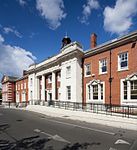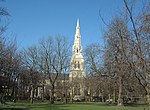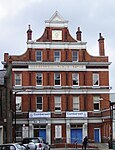Institute of Psychiatry, Psychology and Neuroscience

The Institute of Psychiatry, Psychology and Neuroscience (IoPPN) is a research institution dedicated to discovering what causes mental illness and diseases of the brain. In addition, its aim is to help identify new treatments for them and ways to prevent them in the first place. The IoPPN is a faculty of King's College London, England, previously known as the Institute of Psychiatry (IoP). The Institute works closely with South London and Maudsley NHS Foundation Trust. Many senior academic staff also work as honorary consultants for the Trust in clinical services such as the National Psychosis Unit at Bethlem Royal Hospital. The impact of the Institute's work was judged to be 100% 'world-leading' or 'internationally-excellent' in the Research Excellence Framework (REF 2014). The research environment of the Institute was also rated 100% 'world-leading'. King's College London was rated the second for research in Psychology, Psychiatry and Neuroscience in REF 2014. According to the 2021 US News Ranking, King's College London was ranked second in the world in Psychiatry and Psychology.
Excerpt from the Wikipedia article Institute of Psychiatry, Psychology and Neuroscience (License: CC BY-SA 3.0, Authors, Images).Institute of Psychiatry, Psychology and Neuroscience
De Crespigny Park, London Camberwell (London Borough of Southwark)
Geographical coordinates (GPS) Address Phone number Website External links Nearby Places Show on map
Geographical coordinates (GPS)
| Latitude | Longitude |
|---|---|
| N 51.4703 ° | E -0.0898 ° |
Address
Institute of Psychiatry, Psychology & Neuroscience
De Crespigny Park 16
SE5 8AF London, Camberwell (London Borough of Southwark)
England, United Kingdom
Open on Google Maps









